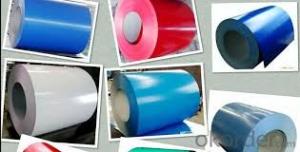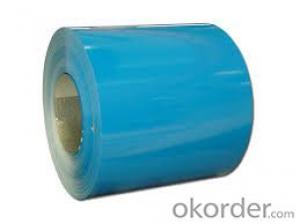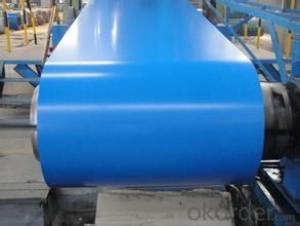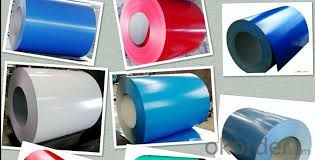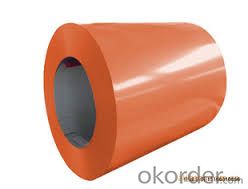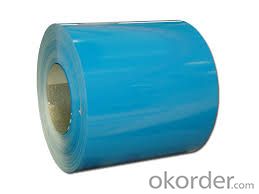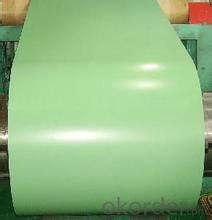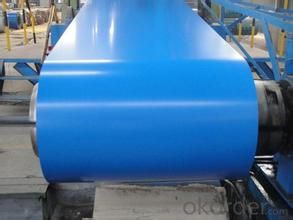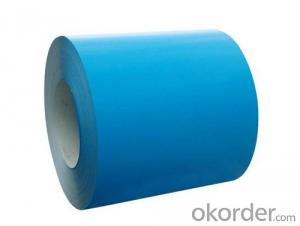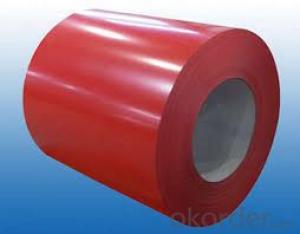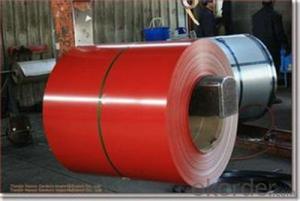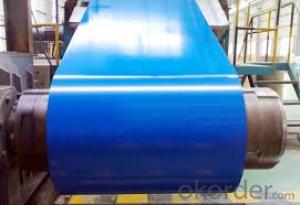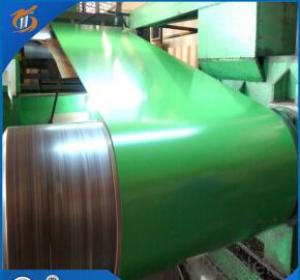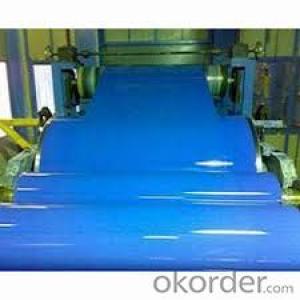Prepainted Galvanized rolled steel Coil-CGCC
- Loading Port:
- Tianjin
- Payment Terms:
- TT OR LC
- Min Order Qty:
- 100 m.t.
- Supply Capability:
- 500000 m.t./month
OKorder Service Pledge
OKorder Financial Service
You Might Also Like
Description:
Prepainted Galvanized Steel usually refers to have substrateprocessed with surface processed and coated then(roller coated )or bonded organic thin film and baked, and it is able to be processed tofinal prodevtion .
PrepaintedGalvanized Steel qualified with excellent decorative ,formability ,corrosionresistance ,coating adhesion ,can keep for a long time as well as maintainfresh color .For color coated steel sheet can obtain good economicbenefit by steel belt wood ,efficient in construction and save energy ,preventpollution etc.Which is an ideal material;for manufacturing board.
Specification:
Yield Strength | (Mpa) 280-320 |
Tensile Strength | (Mpa) 340-390 |
Elongation | 20%-30% |
Reverse Impact | 9J |
T-bending | ≥2T |
Pencil Hardness | ≥2H |
Duration Of Salt Spray Test | 500 H |
Bending At 180 Degree | No crack, purling and fraction |
Applications:
Out door: roof, roof structure, surface sheet of balcony, frame of window, door, door of garage, roller shutter door, booth, Persian blinds, cabana, etc.
In door: door, isolater, frame of door, light steel structure of house, home electronic appliances, etc.
Images:
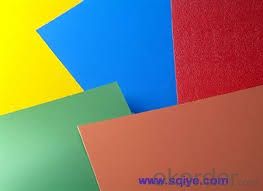
Packaging & Delivery :
The packing of coils consists of anti-damp paper, PVC film, hardboard paper, steel box, strapped with steel strips, fitted with locks and edge protectors and guarantees the optimal condition of the delivered goods. Each coil can be additionally fitted with wooden/steel skids(eye to the side) or wooden pallets(eye to the sky).
- Q: How are steel coils used in the production of pipes?
- Steel coils are used in the production of pipes by being uncoiled and passed through a series of forming rolls to shape them into a cylindrical tube. These coils provide the raw material needed for pipe manufacturing and ensure a consistent and high-quality product.
- Q: How are steel coils secured during transportation?
- Steel coils are typically secured during transportation using steel strapping, banding, or wire rope. These materials are tightly wrapped around the coils and fastened to prevent any movement or shifting during transit. Additionally, wooden or steel blocking may be used to further secure the coils and prevent them from rolling.
- Q: So I'm trying to decide which is better. I've always had aluminum on my 6 yr old tb gelding as I do hunters on him. He's never had steel on but I've recently moved and the shoer here is more expensive. So is aluminum really worth the extra cash to keep him light on his feet or is steel really not that much different?
- It really depends on your horse. If you horse is a good mover, and average weight steel shoe shouldn't make much of a difference. If the horse is a mediocre mover, sometimes the added weight will make it move worse. You should also understand that one steel shoe is not like another steel shoe- they come in different widths of web and thickness of steel. Some horses that don't do well in regular shoes do better in a light rim shoe or training plate. Discuss your concerns with your farrier, but he/she doesn't have a crystal ball. You may just have to try steel for a cycle and see how your horse does. When I am shoeing a horse that needs lighter weight steel, I tend to use either St. Croix's Lite Rim shoe or steel Concord training plate, or Kerckaert's DR training plate or the Triumph Lite steel shoe. All of these shoes are light weight, have decent traction and good break over.
- Q: I wanna strip down my bike and take off all the paint... im thinking of leaving it just the steal color... Do i need to put anythinng on the steel to coat it or can i just leave it like that... Will it rust or anything?
- If it's stainless steel or aluminum, it won't rust. Chances are the bike parts that have been painted are of metals that will rust. If you like the metal color, then you can get paints that look like metal or you can clear coat it. You might want to consider just a grey primer.
- Q: What are the different methods of welding steel coils?
- There are several methods of welding steel coils, including MIG (Metal Inert Gas) welding, TIG (Tungsten Inert Gas) welding, and resistance welding. MIG welding uses a consumable electrode wire and an inert gas as a shielding medium to create an arc and join the coils. TIG welding, on the other hand, uses a non-consumable tungsten electrode and a separate filler material to create the weld. Resistance welding involves applying pressure and passing an electric current through the coils to create a weld. Each method has its advantages and is chosen based on factors such as the type and thickness of the steel, desired quality, and production requirements.
- Q: Okay, I have looked all ovcer the net and it says diamonds are stronger, but why? I mean, why is diamonds used for the top equiptment rather than steel?
- Because diamonds are denser but a lot more brittle they would break if used the same as most steel also they are vary rare so useing them in mass production would be redecliously expencive.
- Q: How are steel coils annealed for improved properties?
- Steel coils are annealed for improved properties by heating them to a specific temperature and then slowly cooling them down. This process, known as annealing, helps to relieve internal stresses in the steel, increase its ductility, and improve its machinability.
- Q: Can steel coils be coated with zinc-nickel alloy?
- Yes, steel coils can be coated with zinc-nickel alloy. This coating provides excellent corrosion resistance and durability to the steel coils, making them suitable for various applications in industries such as automotive, construction, and manufacturing.
- Q: Does anyone know what colour steel is?How hard steel is?The density of steel?Conductivity of steel? (Heat and electricity)Reactivity of steel?Melting and boiling points of steel?And the malleability and ductility of steel?Ive looked all over the net and i cant find anything. Can someone please answer these questions or give me a website?THANKS!
- It's going to be made from a Shock Resisting Tool Steel ideally. Those steels average .50-.55 % carbon. They combine the ability to withstand repeated blows with excellent hardenability and toughness.
- Q: What is the material of steel coil 08F and what brand can be used instead?
- 20 steel used for various mechanical parts is not subjected to great stress and toughness, such as rod, sleeve, screw, lifting hook; also can be used for manufacturing in 60 pressure and 450 DEG C using non corrosive medium pipes, pipe; can also be used for carbon and cyanide carburized core strength is not the chain, such as bushings, roller, shaft and gear, sprocket and other important.
Send your message to us
Prepainted Galvanized rolled steel Coil-CGCC
- Loading Port:
- Tianjin
- Payment Terms:
- TT OR LC
- Min Order Qty:
- 100 m.t.
- Supply Capability:
- 500000 m.t./month
OKorder Service Pledge
OKorder Financial Service
Similar products
Hot products
Hot Searches
Related keywords
